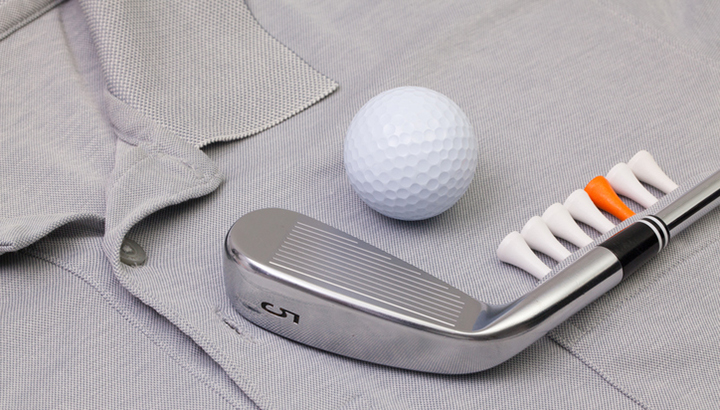Form and function are terms synonymous with good design. Golfing apparel is no exception. Balancing clothing comfort and “fit for purpose” with a splash of panache and co-ordination is good for the soul. It’s also one less distraction or impediment on the course.
Shorts or long pants?
While the R&A and PGA administrators have relaxed their views by allowing pros to wear shorts for pro-am and practice rounds, no such generosity has been extended to the wearing of shorts during competition rounds. Some younger players such as Fowler, Speith and McIlroy have lamented over this somewhat old-fashioned requirement, but adhere nonetheless. Where does this leave the amateur?
If you are invited to a friend’s swanky country club, it should be assumed that the uniform expectation is as close to what you see the pros wear on television. That means long golf pants, belt, collared golf shirt and hopefully an appreciation for matching color and pattern combinations. If, however, it’s a vacation round in Hawaii, shorts with shirt and belt will suffice along with short ankle socks.
If shorts are acceptable on the course being played, then remember that cargo or sports shorts are generally unacceptable. The term “tailored” shorts refers to those designs that can have pleats ironed into the front and belt loops. While these need not be razor-sharp creases, it is a nice touch.
Clothing colors and patterns
“Caddyshack” events are hosted all over the country to celebrate all that is bad about golf attire combinations. Based on the 1980 film, these events ask that players combine the worst of their colors and patterns to create fashion combos that are truly eye-popping!
Don’t be the guy who turns up on course dressed as though you are headed for this event — without any intention of humor. The safest approach is patterned bottoms with a single-color shirt or vice versa. Another safe approach is to select a color scheme that suits you and stick to colors in that range. Some players only invest in blues, grays and black — never straying from the rule to ensure that wardrobe malfunctions are kept to a minimum and that there is an endless supply of “safe” combinations.
Practical must-haves
Guys are prone to chafing or jock-rash, so starting your outfit with comfortable cotton boxers is a sensible preventative measure. Remember you are walking 7,000 yards, give or take a few, and rotating the body, often in warm conditions. The pain and inconvenience of chafing shouldn’t be underestimated. If extreme sweating is an issue, then consider wearing an absorbent undergarment such as a tank or t-shirt that is designed to stay cool while soaking up excessive body moisture.
Wind and rain
Technical wear has improved significantly over recent years to the point where rain or wind should not deter players from getting out there and enjoying a round. The enjoyment factor is aided by good quality clothing to suit the conditions. These include Gore-Tex or lightweight showerproof/windproof, breathable and ventilated materials that are designed for any conditions.
Invest in a set of quality wet weather pants that are easily rolled up and stored in your bag. On top, a high quality 100 percent waterproof golf jacket will serve well over many years, with the alternative of a lightweight, windproof jacket.
Playing in the cold
Thermals, skins or base layers are essential if you play in colder conditions. That under layer closest to your skin will set the tone for additional layers. The game demands that arms, shoulders and waist can move freely, so piling on layer after layer of chunky jumpers will adversely impact your swing. Stay lean and mean — invest in a set of excellent, skin-hugging undergarments that may only require a shirt, lightweight jumper and jacket (for extreme weather protection).
Head, hands and feet
Regardless of the conditions, these extremities require all-weather protection. In cold or wet conditions, use waterproof hats, merino skullcaps, beanies, visors or caps. In winter, keep a waterproof beanie tucked at the bottom of the bag for emergency situations.
Winter golf gloves are a must. And in some cases, dangle a set of golf mittens on the bag and slip them on between shots. Always carry several golf gloves, some stored in zip-up, waterproof bags so that they remain dry. Change them if they get wet — golf is hard enough without having to adapt to sopping wet hands trying to grip the club.
Waterproof shoes are essential. Even if rain is not expected, it is possible that morning dew, hazards, sprinklers or other incidental reasons will arise to challenge poor footwear.
Laundered, ironed and well-fitted clothing is the preference over the latest brand name or corporate-sponsor supplied clothing. Having to witness tummy flashes from the guy whose shirt is too small, or worn and wet trouser cuffs that haven’t been hemmed to fit is a sorry sight.
Nobody is insisting that you arrive with Jordan’s latest Under Armour or Poulter’s runway fashion sense, but attention to how you look rests in the details. If you can’t trust yourself to leave home looking chic then seek the approval from a trusted partner or friend. It might avoid ribbing and guffawing from friends, or worse, being excluded from the course for not meeting the dress code!
— N. Incoll
